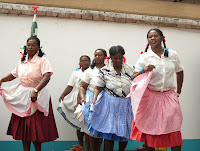ProLiteracy Site Visit: Ecuador

Notes from the Field: Quito, Ecuador – Alesha Anderson, International Program Manager
I am now back in the United States after spending one week in the beautiful Andean Mountains of Ecuador. ProLiteracy is expanding our literacy and micro finance work in South America. We have been working on a financial literacy program with FINCA, an international micro finance institution dedicated to alleviating poverty by providing micro loans for individuals to start small businesses. My trip to Ecuador kicked off with a literacy and micro finance pilot program with three of FINCA Ecuador’s village banks around the outskirts of Quito. ProLiteracy started this program with FINCA El Salvador in 2009, and we are now replicating the model by actively working with FINCA Haiti, FINCA Costa Rica, and FINCA Ecuador. We have found that many people who take out micro loans often face many challenges due in part to low literacy levels–this, in addition to social issues in their communities, makes it hard for them to successfully grow their businesses. ProLiteracy has developed an innovative financial literacy program that takes entrepreneurs through a process of strengthening their businesses and improving their lives by creating a ‘plan’ for three key areas: Business, Community, and Home. This model was recently developed and translated into English, Spanish, and French. Learners are given the opportunity to work one-on-one with a trainer to improve their literacy skills, and work together to solve problems that affect everyone in their community.

During my time in Ecuador, I had the privilege of attending the opening of a FINCA branch in Ibarra, a large city in northern Ecuador. The celebration was very different than what one might experience at a bank branch in the United States. There was music, balloons, dancing, food, and recognition of faithful clients who have been working with FINCA for more than 15 years. Many clients brought fruit, avocados, tomatoes, peppers, and other vegetables from their businesses as a form of saying thank you to FINCA for helping them grow and expand their businesses.
After spending a day with FINCA staff and clients in Ibarra, I returned to the city of Quito to launch the financial literacy program and meet with three village banks.

One of the groups with which I met was largely made up of Quechua women, one of the indigenous groups in Ecuador, who live in the Andean Mountains; many have moved to larger cities like Quito so that they can earn an income selling produce and working at local markets. While most of the women were shy at first, they expressed an interest in learning how to im
prove their businesses by participating in the financial literacy program. I am looking forward to seeing this program grow and working with FINCA Ecuador to help women and their families improve their homes, businesses, and communities through gaining financial literacy skills.
FINCA Ecuador is currently reaching 52,645 clients and 5,408 village banks; 71 percent of their clients are women, many of whom are mothers working as the breadwinners to provide an income for their families. The following images are some pictures from our time with FINCA Ecuador and their wonderful clients. Please stay tuned for more updates about ProLiteracy’s work with village banks in Ecuador!


I think that FINCA is doing an excellent job if is empowering women to provide a regular income for their families. I do have a question though; Does FINCA charge interest to the women that borrow from them? What is the success rate of the small-scale businesses that are financed by FINCA?
ReplyDeleteYes, what is the data supporting the 'success' of these projects?
ReplyDeleteNana675 and GTAK, these are great questions! FINCA does charge interest on their loans but it usually varies by country. You can find information about how they measure success rates directly on their website: www.finca.org
ReplyDelete-Alesha Anderson, International Program Manager, ProLiteracy
Is there a mentoring program that helps these ladies after the fact? I am trying to implement a mentoring program in the United States for my fellow colleagues in teaching. What support do these ladies have when their business or family gets up and growing?
ReplyDeleteJamie: Actually, right now there isn’t a strong mentoring program for many of the women running small businesses, this is why ProLiteracy and FINCA are working together to implement a program where village banks get more support and training. There is a staff person who will be working on an ongoing basis with several village banks in Ecuador to offer financial literacy classes and help clients create a plan in 3 areas: business, home/family, and community.
ReplyDelete-Alesha Anderson, International Program Manager, ProLiteracy
Alesha,
DeleteHi,
Thanks for your reply to my comments.Awesome work!!!I just have a small inquiry.I know that the family plays a very important role in women's lives such as Ecuador.On average, what is the husbands' and fathers' attitudes towards these women that are trying so hard to educate themselves and try to develop financially?
Thanks for sharing your experience this is really great.
ReplyDeleteFinancial Aid
Online Masters degree
Nana675: The response from husbands and fathers toward women gaining an education can greatly vary depending on many factors. There is sometimes push back from husbands in the rural areas especially if they aren’t educated themselves. There is a notion that by the woman gaining an education, he will no longer be the patriarch. Also, women sometimes have to face the belief that a woman’s “place is in the home” not “out in the world” – husbands sometimes also say that women learning together creates an the opportunity for gossip with other women who are also learning. On the other hand, we’ve also heard stories about men being hugely supportive and encouraging their wives to pursue an education which often creates more economic opportunities for the family through better jobs and higher wages, starting micro enterprises, etc.
ReplyDelete@jhonden: You are welcome! Thanks for following our blog.
Alesha Anderson, International Programs Manager, ProLiteracy